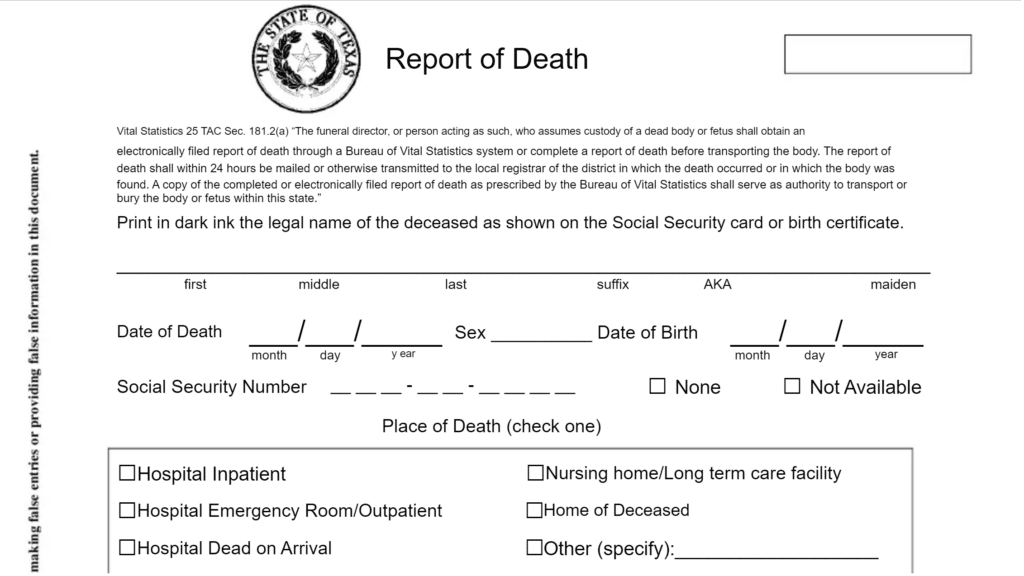Can you, a normal everyday citizen, legally transport a dead body? Is it even legal for you to put the dead body of your loved one in your vehicle to drive it home for burial in your backyard?
Yes, this blog is insensitive. I’m sorry. Yes, this blog is undignified. I’m sorry. However, in the words of Dr. Gregory House, “Death has no dignity.”
Rather than tip-toeing around this delicate topic, we’re just going to address this as crudely as possible. If you’re sensitive, get offended easily, or are triggered by a cavalier attitude about death, then this blog is not for you.
Let me explain further. We’re talking about the legal transportation of someone who passed away and who has been released by the hospital or coroner. We’re NOT talking about just going to your grandma’s house to load up her dead body without notifying the authorities. You CAN’T do that!
We’ve already discussed who has the right to control the disposition of remains of the decedent. But now, we’re discussing the logistics of how to do that without the use of a funeral home or even a licensed funeral director if you want to bury your dead privately.
Is it even legal to transport a dead body?
First, before we go any further, you must know that the terminology used in the law is, “dead body.” I’m not intentionally being dramatic by calling it a dead body. I’m just using the definition used in the law. I know it is insensitive. Again, I’m sorry!
–Transportation of Dead Bodies – Tex. Admin. Code § 181.3
To answer the question, YES! It is actually legal for you to transport a dead body under the right circumstances.
There are different rules if you’re using a common carrier to transport a dead body. (Southwest, Amtrak, Uber, etc.) We’ll talk about how to Uber a dead body some other time.
Today we’re going to discuss the transportation of a dead body in a private vehicle, not a hearse, by a private individual. The important thing is to know who can legally transport a dead body.
Who can legally transport a dead body?
Not just anybody can transport the dead body of your Aunt Edna in the back of their car. The only person who is authorized to transport her dead body would be her Agent to Control Disposition of Remains, or someone acting under the direction of that Agent.
We’ve already gone pretty in depth into the appointment of an Agent to Control Disposition of Remains, so we won’t rehash all of that here.
The short version is that Aunt Edna could have appointed someone to be her Agent to Control Disposition of Remains, and if she didn’t do that, then there is a statutory list of people who would take that position in a very specific order.
–Disposition of Remains; Duty to Inter – Tex. Health & Safety Code § 711.002
So, if you’re considering transporting a dead body, then you have to be the Agent, or authorized by the Agent, to do so. Not only that, but you’ll also want to have the proper paperwork.
What documents do you need to legally transport a dead body?
In order to transport a dead body, there are certain documents you need to have. Can you imagine how a police officer would react if they found a dead body in your car without the proper paperwork?!
More specifically, there is one specific document that you need to have in order to transport a dead body.
According to the Texas Administrative Code, a person who assumes custody of a dead body shall obtain or complete a Report of Death before transporting the body.


This Report of Death must be filed with the Vital Statistics Section of the Texas Department of State Health Services, and a copy must also be filed with the local registrar. A copy of this Report of Death serves as the authority to bury or transport a dead body within the State of Texas.
–Assuming Custody of Body – Tex. Admin. Code § 181.2
Can you transport a dead body in the passenger seat?
Believe it or not, there are no laws that provide guidance on exactly where in your vehicle you must transport a dead body. To be honest, there’s not even a requirement that you transport a dead body inside of your vehicle.
Now, before you consider recreating National Lampoon’s Vacation, you should first consider whether your actions could constitute Abuse of a Corpse.
A person commits an offense if the person, without legal authority, knowingly disinters, disturbs, damages, dissects, in whole or in part, carries away, or treats in an offensive manner a human corpse.
–Abuse of Corpse – Tex. Pen. Code § 42.08(a)
So, strapping the dead body of your loved one to the luggage rack? Probably offensive. Placing the dead body of your loved one in the cargo portion of your SUV? Probably not offensive. Pulling a Weekend at Bernie’s with your loved one in the passenger seat so you can ride in the carpool lane? Maybe offensive.
Regardless of where you transport a dead body in your vehicle, there are two requirements that you need to be aware of.
Are you required to use a casket to transport a dead body?
Number one, if you’re considering transporting the dead body of your loved one for a private funeral, then you might also be looking at caskets. However, there is no requirement that you transport the dead body in an actual casket.
The law says that the dead body must be encased in a container which insures against seepage of fluid and the escape of offensive odors, but doesn’t specifically mention a casket.
–Transportation of Dead Bodies – Tex. Admin. Code § 181.3
If you’re considering transportation containers, you can certainly use a casket if you desire, but you might also consider using a body bag. Unsurprisingly, you can find both of these on Amazon, and some with Prime delivery. After seeing the price difference, you might understand why people sometimes choose home burials.
-See Body Bag
-See 18 Gauge Metal Casket/Coffin
Number two, whichever container you use, just know that the law also requires the Report of Death to be enclosed in a strong envelope and attached to the container in which the body is enclosed.
–Transportation of Dead Bodies – Tex. Admin. Code § 181.3
Are there limitations on where you can bury a dead body?
Yes, there are a ton of restrictions on where you can bury a dead body. You can’t simply bury your dead in just any backyard. Remember, you’re not just burying a dead body, but you’re also creating a brand new cemetery. Yes, a cemetery of one is still a cemetery.
If you live within the city limits, then you’ll have to refer to your city’s ordinances to determine whether burial is permitted there. Generally though, you can’t establish a cemetery in or within one mile of the boundaries of a municipality with a population of 5,000 to 25,000, in or within five miles of the boundaries of a municipality with a population of at least 200,000, and varying distances for municipalities with populations in between.
–Location of Cemetery – Tex. Health & Safety Code § 711.008(a)
Even if you live in a rural area of your county, you must still check your county regulations to determine whether there are any particular registration requirements. Contact the County Clerk to see what regulations might pertain to you.
If you’re an individual, or unincorporated family, then you aren’t considered a “cemetery organization” under Texas law, so you’ll avoid a lot of the red tape associated with it.
-See Tex. Atty Gen. Opinion GA-0448
But that doesn’t mean that you will avoid all of the red tape. Before you decide to create a new cemetery, beware of the duties that you’re also taking on. We’re not going to cover all of the steps necessary to create a new cemetery because that would take up an entire blog all on its own.
All that is important for you to know at this point is that it is possible (and legal) to take your loved one home for burial in certain circumstances, but you’ll want to have an experienced attorney assisting you if you don’t already have an established home cemetery.
I mean, who doesn’t have a home cemetery.
–Authored by Matthew L. Harris, Esq.,
Matthew Harris Law, PLLC – Estate Management Division
1101 Broadway, Lubbock, Texas, 79401-3303
Tel: (806) 702-4852 | Fax: (800) 985-9479

